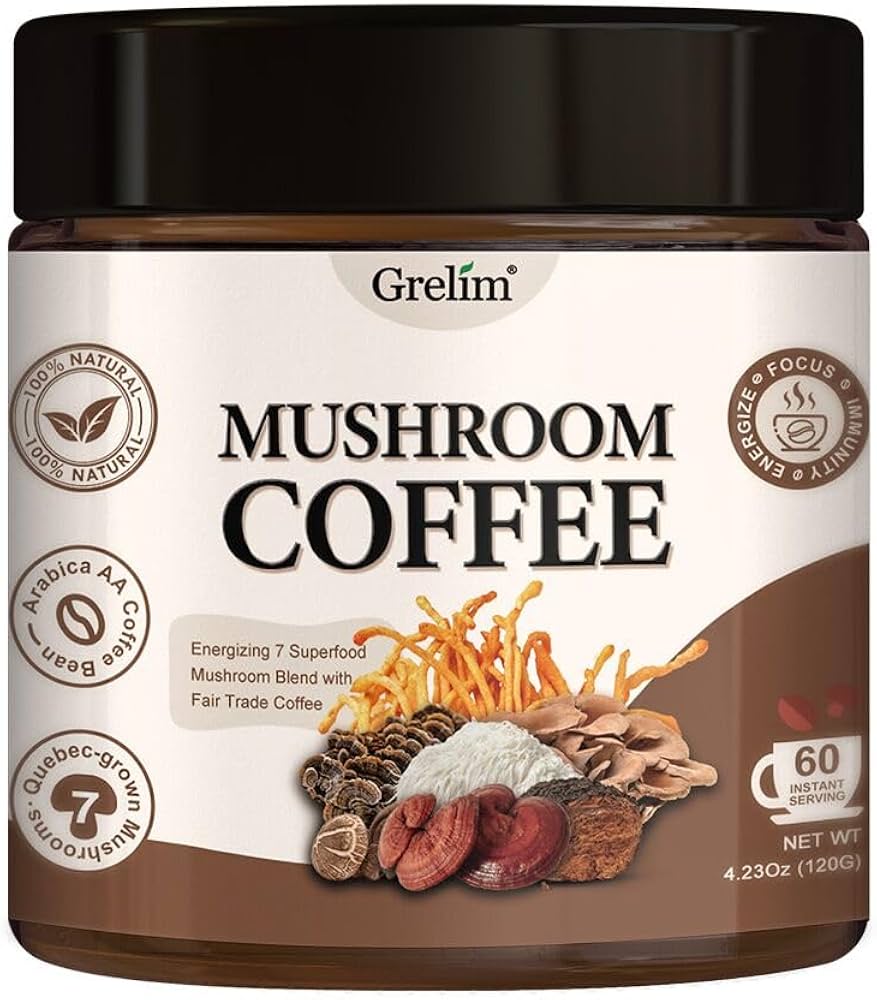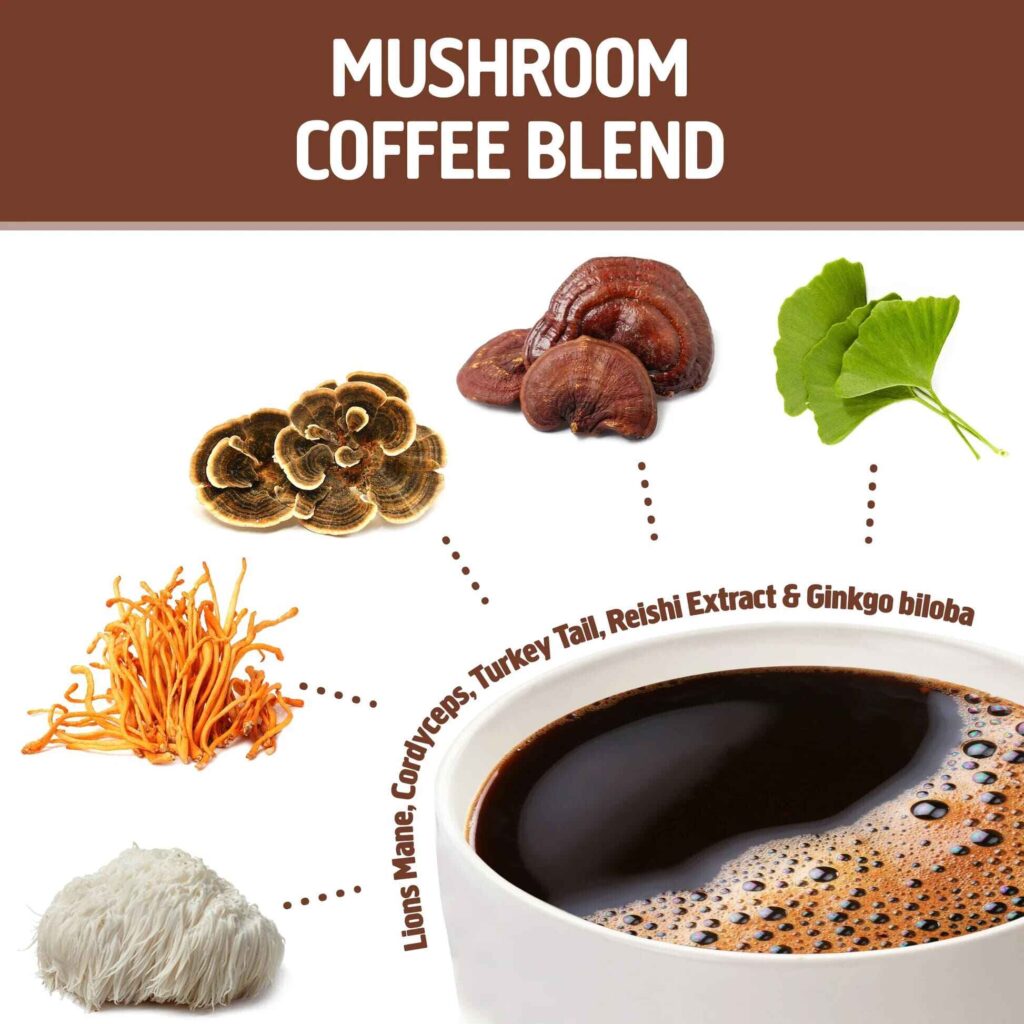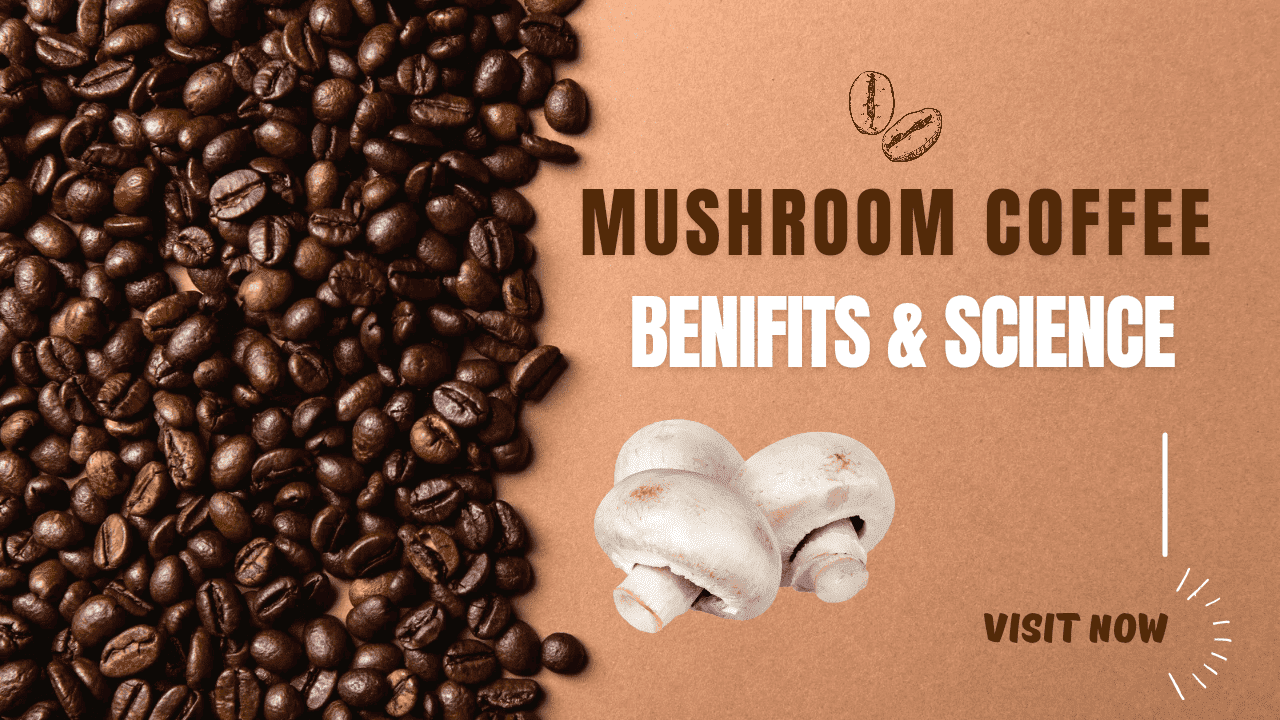Introduction
Mushroom coffee, a blend of traditional coffee and medicinal mushrooms, is capturing the imagination of health enthusiasts around the globe.
Mushroom coffee is, trace its historical roots, examine its health benefits, compare it to traditional coffee, and provide practical advice on preparation. We’ll also highlight popular brands and review scientific research to better understand this intriguing beverage. Visit

Table of Content
- What is Mushrooms Coffee?
- Common Mushrooms in Mushrooms Coffee
- Origins and History
- Ancient Use of Medicinal Mushrooms
- The Advent of Mushrooms Coffee
- Health Benefits of Mushrooms Coffee
- Enhanced Cognitive Function
- Immune System Support
- Stress Reduction
- Increased Energy and Athletic Performance
- Mushrooms Coffee vs. Traditional Coffee
- Caffeine Content
- Health Benefits
- Potential Drawbacks
- How to Prepare Mushrooms Coffee
- Instant Mushrooms Coffee
- Ground Mushrooms Coffee
- Homemade Blends
- Popular Brands of Mushrooms Coffee
- Scientific Research and Evidence
- Notable Studies
- Conclusion
- FAQs
What is Mushroom Coffee?
Mushroom coffee is a hybrid drink that incorporates powdered medicinal mushrooms into traditional coffee. The mushrooms used are not typical culinary varieties but are selected for their health benefits. These mushrooms are processed into a fine powder and mixed with coffee grounds or instant coffee. Also Visit
Common Mushrooms in Mushroom Coffee
- Chaga (Inonotus obliquus): Known for its high antioxidant content.
- Reishi (Ganoderma lucidum): Famous for its stress-relieving and immune-supporting properties.
- Lion’s Mane (Hericium erinaceus): Valued for its potential cognitive and nerve-regenerative benefits.
- Cordyceps (Cordyceps militaris): Recognized for its ability to boost energy and athletic performance.
- Turkey Tail (Trametes versicolor): Praised for its immune-boosting properties.
Each mushroom contributes distinct benefits, making mushroom coffee a versatile option for those seeking a functional beverage that supports various aspects of health.

Origins and History
The use of mushrooms for medicinal purposes dates back thousands of years, spanning multiple cultures and civilizations. Here’s a look at the historical context of medicinal mushrooms and how they came to be combined with coffee.
Ancient Use of Medicinal Mushrooms
- Traditional Chinese Medicine (TCM): In TCM, mushrooms like Reishi and Chaga have been used for centuries to promote health and longevity. These mushrooms were often used in teas and tinctures to enhance overall well-being.
- Ancient Greece and Rome: Historical records show that ancient Greeks and Romans used various types of mushrooms for their health benefits, though their practices were less formalized than those in TCM.
- Indigenous Cultures: Various indigenous cultures around the world, including Native Americans, also recognized the health benefits of mushrooms. These practices often involved using mushrooms in ceremonial contexts as well as for their medicinal properties.

The Advent of Mushroom Coffee
The concept of combining mushrooms with coffee is relatively modern. The idea began to gain traction in the early 2010s as part of a broader trend toward functional foods and beverages. Pioneering companies started to experiment with blending powdered medicinal mushrooms into coffee, leading to the creation of mushroom coffee.
This innovative product aligns with the growing interest in health and wellness, where consumers are increasingly looking for ways to enhance their daily routines with functional foods. Mushroom coffee emerged as a natural extension of this trend, offering a way to integrate ancient health practices into contemporary lifestyles.
Health Benefits of Mushroom Coffee
Mushroom coffee is celebrated not just for its unique flavor but for the array of potential health benefits it offers. Let’s explore some of these benefits in detail.
Enhanced Cognitive Function
Lion’s Mane is one of the most studied mushrooms in terms of cognitive enhancement. This mushroom is believed to support brain health through its effects on nerve growth factor (NGF). NGF is crucial for the survival and growth of neurons, and its stimulation may aid in improving cognitive functions such as memory and focus.
- Scientific Evidence: A study published in Frontiers in Aging Neuroscience found that Lion’s Mane supplementation improved cognitive function in older adults. The study indicated that Lion’s Mane might support cognitive health by stimulating NGF production (source).

Immune System Support
Both Chaga and Turkey Tail mushrooms are renowned for their immune-boosting properties. Chaga is packed with antioxidants, which help combat oxidative stress and inflammation. Turkey Tail contains polysaccharides like beta-glucans, which are thought to enhance the immune system’s ability to respond to pathogens.
- Scientific Evidence: Research published in International Journal of Medicinal Mushrooms highlights the antioxidant properties of Chaga and its potential to support immune health (source). Similarly, Turkey Tail has been shown to have immune-modulating effects, as evidenced by various clinical studies (source).
Stress Reduction
Reishi is known as the “mushroom of immortality” in traditional medicine due to its stress-reducing and adaptogenic properties. Adaptogens are substances that help the body adapt to stress and restore balance. Reishi mushrooms are believed to support mental health by reducing anxiety and improving overall well-being.
- Scientific Evidence: A study published in Journal of Clinical Psychopharmacology found that Reishi may help reduce symptoms of anxiety and depression. This suggests that Reishi could be beneficial in managing stress and promoting emotional balance (source).
Increased Energy and Athletic Performance
Cordyceps is celebrated for its potential to enhance physical performance and endurance. This mushroom is thought to improve energy levels by increasing ATP production, which is essential for cellular energy. Athletes and fitness enthusiasts often turn to Cordyceps for its potential benefits in boosting exercise performance.
- Scientific Evidence: A study published in The Journal of Alternative and Complementary Medicine investigated the effects of Cordyceps on exercise performance in older adults. The results indicated that Cordyceps supplementation improved physical performance and endurance (source).
Mushroom Coffee vs. Traditional Coffee
When comparing mushroom coffee to traditional coffee, several factors come into play, including caffeine content, health benefits, and potential drawbacks.
Caffeine Content
Traditional coffee is known for its caffeine content, which provides a stimulating effect that can boost alertness and concentration. Mushroom coffee typically contains less caffeine than a standard cup of coffee, making it a suitable option for those who are sensitive to caffeine or wish to reduce their intake.
- Caffeine Levels: The caffeine content in mushroom coffee can vary depending on the brand and blend. Generally, mushroom coffee contains around 50-70 mg of caffeine per serving, compared to the 95-150 mg found in a standard cup of coffee.

Health Benefits
Traditional coffee does offer health benefits, such as antioxidant properties and a potential protective effect against certain diseases. However, mushroom coffee adds an extra layer of potential benefits due to the medicinal mushrooms included. These benefits may include improved cognitive function, enhanced immune response, and reduced stress levels.
- Comparison: While traditional coffee may offer temporary energy boosts and antioxidant benefits, mushroom coffee aims to provide longer-lasting health benefits through its mushroom ingredients.
Potential Drawbacks
Some individuals may find the taste of mushroom coffee to be an acquired one. The flavor profile can be different from traditional coffee, often described as more earthy or umami. Additionally, while mushroom coffee is generally considered safe, it’s important for those with mushroom allergies or specific health conditions to consult with a healthcare provider before incorporating it into their diet.
- Taste and Preference: The taste of mushroom coffee can vary based on the type of mushrooms used and the blend’s formulation. Some people may appreciate the earthy notes, while others may prefer a more traditional coffee flavor.
How to Prepare Mushroom Coffee
Preparing mushroom coffee is straightforward and similar to making regular coffee. The method you choose will depend on whether you’re using instant mushroom coffee, ground mushroom coffee, or making your own blend.
Instant Mushroom Coffee
Instant mushroom coffee is the most convenient option. It comes in pre-packaged forms that dissolve quickly in hot water. Simply follow the instructions on the package for the recommended amount of coffee and water.
- Preparation: Add one or two teaspoons of instant mushroom coffee powder to a cup of hot water. Stir well and adjust the amount according to your taste preferences.
Ground Mushroom Coffee
If you have ground mushroom coffee, you can brew it using your preferred coffee-making method. This could include a drip coffee maker, French press, or pour-over.
- Brewing Tips: Use a standard coffee-to-water ratio (usually 1-2 tablespoons of coffee per 6 ounces of water). Brew as you would regular coffee, and adjust the amount of coffee based on your taste and desired strength.
Homemade Blends
Creating your own mushroom coffee blend involves mixing powdered medicinal mushrooms with your regular coffee grounds. This allows you to customize the blend to your taste and health preferences.
- DIY Recipe: Mix 1-2 teaspoons of powdered medicinal mushrooms (such as Lion’s Mane or Reishi) with your regular coffee grounds. Brew using your preferred method. Experiment with the ratio to find a balance that suits your taste.
Popular Brands of Mushroom Coffee
Several brands have gained recognition in the mushroom coffee market, each offering unique blends and formulations. Here are a few notable ones:
Four Sigmatic
Four Sigmatic is a leading brand in the mushroom coffee industry, known for its diverse range of mushroom-infused products. They offer blends that incorporate mushrooms like Reishi, Lion’s Mane, and Chaga.
- Product Offerings: Four Sigmatic provides various mushroom coffee options, including single-serving packets and larger containers. Their products are designed to cater to different health goals, such as stress relief and cognitive enhancement. For more details, visit Four Sigmatic.
Ryze
Ryze offers mushroom coffee with a focus on cognitive and stress-relief benefits. Their blends often include Lion’s Mane and other adaptogenic mushrooms.
- Product Features: Ryze emphasizes the use of high-quality mushrooms and organic coffee in their blends. They offer both instant and ground options. Learn more at Ryze Coffee.
Organo
Organo features mushroom coffee that incorporates Ganoderma lucidum, also known as Reishi. Their products are designed to support overall wellness and immune health.
- Product Highlights: Organo provides various formats, including instant coffee and coffee mixes. Their products are marketed as enhancing overall health and vitality. Explore their offerings at Organo Gold.

Scientific Research and Evidence
Scientific research on mushroom coffee specifically is still in its nascent stages. However, numerous studies have investigated the individual mushrooms used in these blends. This research provides a basis for understanding the potential benefits of mushroom coffee.
Notable Studies
- Lion’s Mane and Cognitive Function: Research has demonstrated that Lion’s Mane may support cognitive health by promoting nerve growth and regeneration. The study published in Frontiers in Aging Neuroscience highlights the potential of Lion’s Mane to improve cognitive function in older adults (source).
- Chaga and Antioxidants: Chaga mushrooms are known for their high antioxidant content. Research published in International Journal of Medicinal Mushrooms outlines the antioxidant properties of Chaga and its potential to support immune health (source).
- Reishi and Stress: Studies have shown that Reishi mushrooms may help reduce symptoms of anxiety and improve overall well-being. The evidence suggests that Reishi’s adaptogenic properties can support emotional balance (source).
- Cordyceps and Exercise Performance: Research indicates that Cordyceps may enhance physical performance and endurance. The study published in The Journal of Alternative and Complementary Medicine demonstrates the benefits of Cordyceps supplementation for exercise performance in older adults (source).
Conclusion
Mushroom coffee represents a remarkable intersection of traditional medicinal practices and modern coffee culture. By blending the energizing effects of coffee with the therapeutic benefits of medicinal mushrooms, mushroom coffee offers a unique option for those seeking both a flavorful beverage and functional health benefits.
While more research is needed to fully understand the effects of coffee as a combined product, existing studies and historical use provide a promising outlook. Whether you’re interested in cognitive enhancement, immune support, or simply exploring a new coffee experience, mushroom coffee offers a versatile and health-conscious choice.
If you’re intrigued by the idea of mushroom coffee, consider trying it from reputable brands and exploring its potential benefits for yourself. For more information and to explore different options, you can visit:
FAQs
Q1: What is mushroom coffee?
Mushroom coffee is a blend of traditional coffee and powdered medicinal mushrooms. It combines the energizing effects of coffee with the health benefits of mushrooms like Reishi, Lion’s Mane, Chaga, Cordyceps, and Turkey Tail.
Q2: What are the benefits of drinking mushroom coffee?
Mushroom coffee may offer several benefits, including enhanced cognitive function, immune support, stress reduction, and increased energy. The specific benefits depend on the types of mushrooms used in the blend.
Q3: How does mushroom coffee differ from regular coffee?
Mushroom coffee typically contains less caffeine than regular coffee and includes medicinal mushrooms that may provide additional health benefits. It combines the familiar taste of coffee with the potential advantages of mushrooms.


Your article helped me a lot, is there any more related content? Thanks!